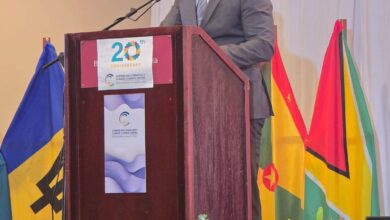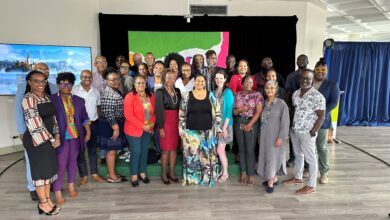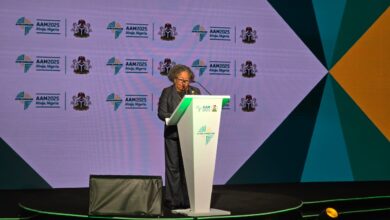Mr. Chairman, Colleagues Heads of Government, Mr. Secretary-General, Honourable Ministers, Members of Parliament, Distinguished delegates, Excellencies of the Diplomatic Corps, Invited guests, Members of the Media, Ladies and Gentlemen, boys and girls.
As I conclude my six-month term as Chairman of the Conference of the Heads of Government I wish to offer not only a retrospective but also to take a brief look at the manner in which we are advancing our Caribbean Integration.
From the outset I wish to publicly acknowledge the support received from the other members of the Conference, other organs of the Community, the Secretary-General and Secretariat staff, in execution of Belize’s responsibility.
At the beginning of my tenure I set out certain priorities for our term of office. These included: Greater Involvement of Civil Society in the decision-making of the Community; closer collaboration with Central America; focusing on regional security; and implementing agreements we have negotiated within our integration movement.
At Belize City, on 4th February 2002, during the Thirteenth Inter-Sessional Meeting of the Conference of Heads of Government, we approved the programme for the removal of restrictions to full implementation of the CARICOM Single Market and Economy (CSME), the “flag ship” in the Community’s work programme. Since then Ministers and officials have been discussing ways in which to accelerate implementation in time to meet important hemispheric and global free trade deadlines. The Agenda before us at this meeting is structured to afford us the opportunity for a frank review of our work and to assess the areas in which we achieved success and those where we have fallen short.
The six month period under review was characterised by an unusually heavy schedule of regional , hemispheric and international high level meetings in which no effort was spared in giving prominence to the Caribbean’s agenda. In February the region’s Foreign Ministers held a frank exchange of views with their counterpart from the United States at their meeting in Nassau.
In March, at the Commonwealth Heads of Government meeting, we examined the challenges being faced by the Commonwealth’s diverse membership under the theme “Continuity and Renewal”. Our presence at Coolum in Australia afforded us a chance to interact with Commonwealth colleagues and discuss ways in which we can enhance our cooperation in improving the quality of life of Caribbean people. At the United Nation’s Conference on Financing and Development hosted by Mexico in March, representatives form Caribbean countries joined the chorus of nations seeking to place development at the forefront of the international agenda.
In April, Guyana hosted the Third UK-Caribbean Forum and we were represented at the Summit meeting of the Rio Group held in San Jose, Costa Rica. During the month of May we shuttled between the Caribbean, New York and Madrid, actively participating in the United Nations Children’s Summit, the second CARICOM-Spain Summit and the Second European Union-Latin American and Caribbean Summit.
We have, at such encounters, emphasised issues of Caribbean concern, such as, the vulnerability of small States; cooperation in stemming the flow of arms and illegal drugs to and through our countries; the HIV/AIDS Pandemic; our efforts to alleviate poverty and conservation of our Caribbean Sea and Environment. Advantage was also taken of such opportunities to solicit the support of traditional partners in bringing such concerns to the forefront of the agenda at fora where the Caribbean is not represented.
We have argued that the developed countries, international financial and other multilateral institutions should adopt coherent and consistent policies in their partnership with developing countries.
In our engagements with partners we sought to expand their hitherto narrow security focus and urged them to recognise the multidimensional nature of the security threat facing our small states. I here give tribute to Barbados for its leadership demonstrated at last month’s Regular Session of the OAS General Assembly in introducing this concept for hemispheric discussion and elaboration.
It was at the insistence of Caribbean delegations that the General Assembly of the Organisation of American States adopted a resolution which calls on the Government of Haiti and the International Financial Institutions to initiate discussions aimed at the resumption of economic cooperation. We will be vigilant in making sure this call is heeded.
Within our own Community, regional experts on the issues of crime and security have been analysing the factors contributing to the unprecedented rise in crime and violence in our Caribbean neighbourhoods .
The current form of globalisation is tightening rather than loosening the international poverty trap. Low income for our export commodities leads to low savings, low savings lead to low investment and low investment leads to low productivity and low income. Only by working together can we break this vicious cycle.
I am conscious of my quasi/cabinet responsibility for sustainable development within CARICOM when I say that our vision of what sustainable development is, and the way we implement that vision, is critical in determining whether we will achieve our supreme objective.
We have recognised that our vision for sustainable development must be guided by a people-centered approach, but is this just a hollow phrase? Are we consistent in our actions to give meaning to that policy by ensuring that people are directly involved in the decision-making process and in the implementation of programmes?
To achieve that requires significant and continued refinement of our governance structures.
Let’s face it: our political systems are by and large inherited from another era and were designed to divide the many for rule by the few. If we are serious about building national consensus about the critical issues affecting our societies, if we are serious about achieving sustainable development, we will have to change that, and put in place new policies, structures, and institutions that will make possible people-centred development.
The first question raised when such a goal is articulated – really it is a challenge to its possibility – is but how can people who really know nothing about national and global economic realities be allowed to take decisions? That very question exposes our failure and poses the solution.
Poverty is not simply the lack of material resources, but more fundamentally the lack of access to knowledge – technical knowledge, scientific and cultural knowledge, sociopolitical and economic knowledge. It is our duty to provide this access to our peoples.
A conscious and educated people will know how to face the challenge of our evolving world order, one in which our economies, made structurally dependent in the colonial era, remain so in the present global system. This is what has made poverty persistent, but only because we have failed to make relevant knowledge accessible to all.
We know that not one of our countries can achieve sustainable development alone; that is why we are together in this Community. We have to work more closely together, and in a more focused manner, and we have to enhance the nature and scope of our solidarity, which is the greatest virtue, and responsibility, of community.
My country, Belize, my government , and I personally stand ready to continue this effort and cooperate fully with the incoming Chair and all the members of our Community to move us closer to our goal of improving the quality of life of our people.





